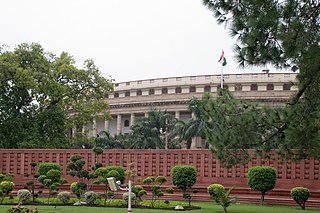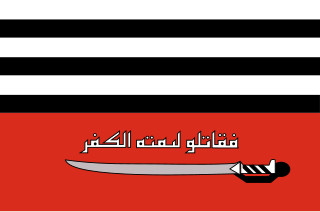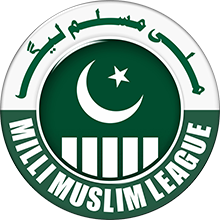Related Research Articles

Harkat-ul-Mujahideen- al-Islami is a Pakistan-based Islamic jihadist group operating primarily in Kashmir. The group have been considered as having links to Osama bin Laden and Mullah Omar.

Jaish-e-Mohammed is a Pakistan-based Deobandi Jihadist terrorist group active in Kashmir. The group's primary motive is to separate Kashmir from India and merge it into Pakistan.
Mohammad Masood Azhar Alvi is a radical Islamist and terrorist, being the founder and leader of the Pakistan-based terrorist organisation Jaish-e-Mohammed, active mainly in the Pakistani-administered portion of the Kashmir region. His actions are not limited to the South Asian region; for instance, BBC News described him as "the man who brought jihad to Britain." On 1 May 2019, Masood Azhar was listed as an international terrorist by the United Nations Security Council.

The 2001 Indian Parliament attack was a terrorist attack on the Parliament of India in New Delhi, India on 13 December 2001. The attack was carried out by five armed assailants and has resulted in the deaths of six Delhi Police personnel, two Parliament Security Service personnel, and a gardener. All the five attackers were killed by security forces.

Harkat-ul-Jihad-al-Islami is a Pakistani Islamist extremist, fundamentalist and terrorist organisation affiliated with Al-Qaeda and the Taliban.

Hafiz Muhammad Saeed is a Pakistani Islamist who co-founded Lashkar-e-Taiba (LeT), a Pakistan-based Islamist militant organization that is designated as a terrorist group by the United Nations Security Council, India, the United States, the United Kingdom, the European Union, Australia, and Russia. He is listed on India's NIA Most Wanted. In April 2012, the United States placed a bounty of US$10 million on Saeed for his role in the 2008 Mumbai attacks that killed 166 civilians. While India officially supported the American move, there were protests against it in Pakistan.

Al-Badr is an Islamist militant group operating in the Kashmir region. The group was allegedly formed by the Pakistani Inter-Services Intelligence (ISI) in June 1998. It is believed the group was encouraged by the ISI to operate independently from their previous umbrella group, Hizb-ul-Mujahideen (HM). Prior to the group's separation from HM, they participated in the fighting in Afghanistan in 1990 as part of Gulbuddin Hekmatyar's Hizb-l-Islami (HIG) alongside other anti-Soviet Afghan mujihadeen. India and the United States have declared it a terrorist organisation and banned it. Pakistan has long been a difficult and disruptive neighbor of Afghanistan, increasing Afghanistan's instability by providing intelligence, weapons and security to the Afghan Taliban and the Haqqani network. But now Pakistan is facing strong backlash both domestically and internationally against its policy of militant sponsorship.

Sipah-e-Muhammad Pakistan (S.M.P) was a Shia organisation and a former political party in Pakistan that was formed in 1993 by Allama Mureed Abbas Yazdani and now after his shahdat and long period of time again his nephew Malik Muhammad Wasi Ul Baqar is looking forward to take responsibility of running Sipah-e-Muhammad Pakistan
Pakistan and state-sponsored terrorism refers to the involvement of Pakistan in terrorism through the backing of various designated terrorist organizations. Pakistan has been frequently accused by various countries, including its neighbours Afghanistan, India, and Iran, as well as by the United States, the United Kingdom, Germany, and France, of involvement in a variety of terrorist activities in both its local region of South Asia and beyond. Pakistan's northwestern tribal regions along the Afghanistan–Pakistan border have been described as an effective safe haven for terrorists by Western media and the United States Secretary of Defense, while India has accused Pakistan of perpetuating the insurgency in Jammu and Kashmir by providing financial support and armaments to militant groups, as well as by sending state-trained terrorists across the Line of Control and de jure India–Pakistan border to launch attacks in Indian-administered Kashmir and India proper, respectively. According to an analysis published by the Saban Center for Middle East Policy at the Brookings Institution in 2008, Pakistan was reportedly, "with the possible exception of Iran, perhaps the world's most active sponsor of terrorist groups... aiding these groups that pose a direct threat to the United States. Pakistan's active participation has caused thousands of deaths in the region; all these years Pakistan has been supportive to several terrorist groups despite several stern warnings from the international community." Daniel Byman, a professor and senior analyst of terrorism and security at the Center For Middle East Policy, also wrote that, "Pakistan is probably 2008's most active sponsor of terrorism". In 2018, the former Prime Minister of Pakistan, Nawaz Sharif, suggested that the Pakistani government played a role in the 2008 Mumbai attacks that were carried out by Lashkar-e-Taiba, a Pakistan-based Islamist terrorist group. In July 2019, Pakistani Prime Minister Imran Khan, on an official visit to the United States, acknowledged the presence of some 30,000–40,000 armed terrorists operating on Pakistani soil. He further stated that previous administrations were hiding this truth, particularly from the United States, for the last 15 years during the War on Terror.

The Lashkar-e-Jhangvi or "Army of Jhangvi", is a Deobandi supremacist, terrorist and Jihadist militant organisation based in Afghanistan. The organisation operates in Pakistan and Afghanistan and is an offshoot of anti-Shia party Sipah-e-Sahaba Pakistan (SSP). The LeJ was founded by former SSP activists Riaz Basra, Malik Ishaq, Akram Lahori, and Ghulam Rasool Shah.

Hyrbyair Marri is a Pakistani activist from the province of Balochistan. He is the fifth son of the Baloch nationalist leader Khair Bakhsh Marri. As of 2017, he resides in London, England.
Abdul Rauf is a Pakistani Deobandi fundamentalist Islamist militant commander of the Jaish-e-Mohammed (JeM), a Deobandi Islamist militant organization which has carried out Islamist militant activities in India & Afghanistan under the support of Pakistan's main intelligence agency.
Haji Namdar Group (HNG), also known as Suppression of Vice and Promotion of Virtue and Local Taliban Movement, is an organisation designated as terrorist in Pakistan.
The Rabita Mosque is a mosque in Oslo, Norway that is supervised by Basim Ghozlan. It has around 3,000 active members.
Tehreek-e-Azaadi Jammu and Kashmir, abbreviated as TAJK, is a terrorist front organisation, run by Hafiz Muhammad Saeed. By Indian government, It is claimed to be a front for Jamaat-ud-Dawa (JuD). In June 2017, it was banned by Pakistan after India raised the issue at the Financial Action Task Force (FATF), a global anti-financial terror body at Paris in February 2017. On 8 June 2017, TAJK was placed on the list of "proscribed organisations" by the National Counter Terrorism Authority (NCTA), an Internal Counterterrorism Authority of Pakistan under Interior Ministry.

The Milli Muslim League is an Islamist political party launched by its president Saifullah Khalid. The professed aim of the party is to make Pakistan "a real Islamic and welfare state". The Election Commission of Pakistan does not recognise the party. The United States Department of State regards it as a front for the terrorist organisation Lashkar-e-Taiba. It also stated that its president Saifullah has ties with the alleged terrorist organization.
Organizations designated as terrorist by Bahrain are organizations that have been designated by the Bahrain government as terrorist organisations. The Ministry of Foreign Affairs maintains a public list of designated terrorist individuals and entities.
The Aid Organization of the Ulema (AOU), formerly known as the Al Rashid Trust is an NGO based in Pakistan. Beginning in 1996, it supported "charity and welfare projects in Afghanistan and Pakistan" while also providing "financial and legal support to Muslim militants around the world." According to the United States Department of the Treasury, it began raising funds for the Taliban in 1999. It was established by Islamic scholar and jurist Rashid Ahmed Ludhianvi.
References
- 1 2 3 "Rabita Trust". South Asia Terrorism Portal.
- ↑ "Names of 61 banned outfits in Pakistan, JuD under observation". Dispatch News Desk. December 18, 2015.